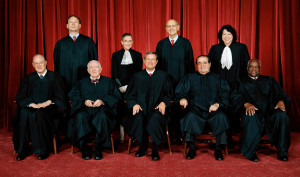Let Obama Appoint Scalia’s Replacement—History is on His Side

Dear Senators McConnell, Cruz, Grassley, etc,
President Obama has over eleven months left in office. Senator McConnell, your call not to fill the Supreme Court vacancy until after a new President has taken office is not surprising from the man who greeted the Obama administrations earliest days with the statement that his highest priority was to “deny President Obama a second term.” Senator McConnell, you been obstructionist from the get-go. Politico calls you “the face of Republican obstructionism.” This is the latest in a long line of unpatriotic—I might even say treasonous—refusals on the part of the Republican leadership to advance almost any part of Obama’s “change” agenda. From here, it sure looks like racism; no president in my memory has ever faced such unrelenting hostility.
Not only is there no reason to delay this nomination almost a year, but history supports quick action. In fact, both McConnell and Grassley voted to seat Justice Anthony Kennedy, in February, 1988—Reagan’s last year. The vote was 97-0, with three Democrats absent.
The record is clear. Of the seven instances in the 20th century where a Supreme Court vacancy opened in an election year, the Senate confirmed six, most of them quite rapidly. The seventh was not about waiting for a new president to be elected but about the Senate being in recess as a new Court season was about to start. Eisenhower made a recess appointment of William Brennan (of the opposite party) just weeks before the 1956 election; he was confirmed when the Senate went back into session (and Eisenhower had been re-elected) in early 1957.
There was one rather different situation: Abe Fortas, already on the Court and nominated by Lyndon Johnson in 1968 to become Chief Justice. Ethics considerations were the main reason this nomination went nowhere, though the argument about the change of administration was raised.
Senator McConnell and your cronies: Though you have been utterly disrespectful to the Administration and have ignored the strong mandate for change that elected Obama twice, we have been patient. Our patience is at an end. If you do not let the nomination go forward, we will not just flood you with calls and letters. We will picket you again and again. We will engage in appropriate nonviolent action. And we will do our best to bring about a Democratic supermajority in both houses of Congress.
